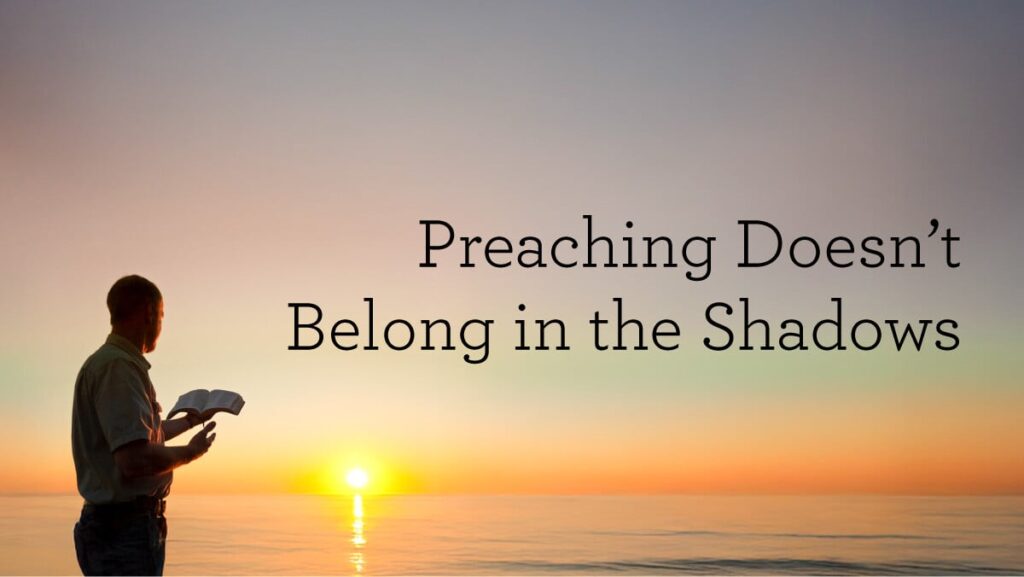Preaching Doesn’t Belong within the Shadows

William Sangster, the twentieth-century Methodist preacher, started a quantity on preaching with these phrases: “Preaching is within the shadows. The world doesn’t imagine in it.” At the moment the state of affairs is graver nonetheless. Regardless of its restoration in some pockets of the worldwide church in latest many years, robust, wholesome preaching largely stays within the shadows—however now it appears many church buildings don’t imagine in it.
Expository preaching is marked by doctrinal readability, a way of gravity, and convincing argumentation. It makes use of the Bible to evangelise the Bible. However a lot of what emanates from trendy pulpits misses the mark. We must always not count on preaching that fails to elucidate the Scriptures and exalt Jesus Christ to offer something greater than a superficial impression within the lives of its hearers.
Expository preaching makes use of the Bible to evangelise the Bible.
How can we clarify the dearth of expository preaching in lots of immediately’s church buildings? A lack of confidence within the Bible and an inclination to struggle the flawed battles are two distinguished causes.
A Lack of Confidence within the Bible
Lately there was an erosion of confidence within the Bible’s authority and sufficiency. A number of elements are at work to undermine the church’s view of the Bible.
Undermined by Liberalism
Within the early nineteenth century, the church was at struggle—not in opposition to flesh and blood however in opposition to theological liberalism. Sure teams challenged the miraculous, questioned the divine, and contested the New Testomony’s historicity. Evangelicals largely weathered that storm, and most of the empty church buildings we see immediately testify to the futility of the search for a demythologized Christ.
However the battle for the Bible didn’t die with nineteenth-century liberalism. It’s alive and nicely immediately, although in subtler kinds. The struggle wages on in sure schools, for instance, with college students sitting below the instruction of professors who’re theologically conservative in identify solely. “We affirm Jesus’ resurrection,” they’ll say, “simply not His bodily resurrection. It’s a non secular or metaphorical resurrection the Bible has in thoughts.”
If colleges and establishments are coaching the subsequent era of ministers to embrace—or not less than to be sympathetic towards—such views, it ought to come as no shock that the church buildings led by these ministers will lose confidence within the Bible’s core teachings.
Undermined by Felt Wants
Secondly, and more and more, sermons start with man and his want relatively than with God and His glory. The Scriptures are uncared for or abused, serving as a springboard for talks far faraway from biblical exposition.
Talking at a pastors’ convention, Dick Lucas as soon as warned of this felt-needs method to preaching, explaining that the pew can not management the pulpit; pastors can not ship demand-led preaching, as a result of nobody calls for the Gospel. Maybe that is what Paul had in thoughts when he instructed Timothy to evangelise the phrase “in season and out of season” (2 Tim. 4:2). Even when individuals demand one thing else, the pastor’s process is to evangelise the Bible.
Our sermons should start with God and His glory and never with man and his want.
Undermined by Extrabiblical “Prophetic” Phrases
Thirdly, whether or not he is aware of it or not, pastors might sideline the Bible’s authority once they use phrases like “God spoke to me” or “That’s what God stated then; that is what God is saying now.” Or maybe his individuals would possibly method him, saying, “Pastor, I’ve this downside, and I’m wondering should you wouldn’t give me a phrase immediately from God to handle it.”
Like the brand new liberalism, this assault on the Bible takes a refined kind. Sinclair Ferguson feedback that whereas many such pastors will deny “that additions are being made to the canon of Scripture, it’s nonetheless implied that an precise addition is being made to the canon of residing.”
God speaks authoritatively and sufficiently in His written Phrase. The duty of the preacher is to proclaim it and apply it.
Undermined by Psychological Concept
Lastly, confidence within the Scriptures has been eroded by a preoccupation with psychological concept. Too many trendy pulpits provide a wierd mix of psychology and theology, leading to a paradigm the Bible wouldn’t acknowledge. When sin is redefined when it comes to missing shallowness, individuals will probably be directed towards a psychologist’s sofa however to not the Savior’s cross.
A Tendency to Struggle the Unsuitable Battles
A second purpose pastors cease preaching expositionally is due to an inclination to make use of the pulpit to struggle the flawed battles.
There are various “civilian pursuits” (2 Tim. 2:4) through which a pastor can get tangled—and these issues are usually not at all times inherently dangerous to handle! But when secondary points turn into the only focus of a pastor’s ministry, the end result will probably be an eventual and inevitable drift away from devoted preaching.
The political pulpit is an instance. When a pastor turns into satisfied that the central concern dealing with the church is political relatively than theological, exposition will take a again seat to political speeches—for calls to “wage struggle for the soul of the nation.”
The Bible calls us to wage struggle not for governing entities however for everlasting souls, no matter the political local weather through which they reside. Whether or not people are below the burden of a dictatorial regime, residing in an atheistic communist state, or in an setting of rampant capitalism, the necessity is similar: Women and men want to listen to the place they stand in relationship to God. If a congregation loses this focus, it is going to quickly prioritize voting over praying, mobilizing on the energy of human agendas relatively than on the divine mandate to make disciples.
Martyn Lloyd-Jones, preaching in Canada on one event, clarified what true Gospel-proclamation is and isn’t:
The factor that makes the Christian message a Gospel is that it’s a proclamation of the excellent news.
It isn’t simply topical feedback on the most recent scandal within the newspaper or the most recent bits of reports. It isn’t that we spend our time in telling kings and princes and presidents and prime ministers how they should be operating their nations and the way they should be fixing the worldwide downside. We aren’t certified to take action. …
What was it that the Apostle preached about? Did the Apostle preach politics to those individuals? Did he say to them that it’s about time you bandied yourselves collectively and raised a military to rid yourselves of the yoke of the Roman Empire? Did he object to taxation? Did he protest in opposition to the varied issues that had been occurring? That was not his message in any respect.
And politics is only one instance of a secondary concern that may overtake a pulpit. Pet doctrinal points, denominational disputes, issues of desire and apply—these and extra moreover, when wrongly prioritized, will displace the Gospel preaching that needs to be central to pulpit ministry.
So how are we to find out what battles to struggle? Initially, by studying the Bible prayerfully and dependently. We’ve got the ministry of Christ and His apostles as our instance. Whereas they weren’t ignorant to the cultural points earlier than them, they had been clear on their emphasis: Irrespective of the context, they preached the Gospel.
An Invitation to Get better Expository Preaching
Writing simply after the Second World Conflict, James S. Stewart summarized what he believed was the foundation of the decline in expositional preaching by quoting the Anglican bishop Charles Gore: “The illness of recent preaching is its search after reputation.” This similar illness threatens to contaminate immediately’s church buildings. Quite than preaching the Bible, some preachers have tried to achieve cultural traction by addressing felt wants and integrating psychology with theology. And relatively than preaching the Gospel, sure pulpits have turn into nothing greater than cleaning soap containers for the most recent political or cultural moments.
These emphases are standard. They scratch itching ears. However they may by no means produce saving religion. The Gospel proclaimed from the Bible is the ability of God for salvation (Rom. 1:16–17 ).
For a lot of, it’s excessive time to convey preaching out of the shadows—to borrow Sangster’s phrase—and into its rightful place: entrance and middle, guarding and guiding the church.
This text was tailored from the sermon “What Occurred to Expository Preaching?” by Alistair Begg.








